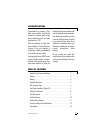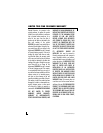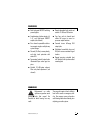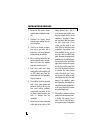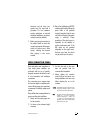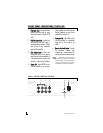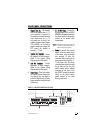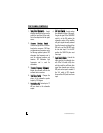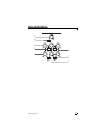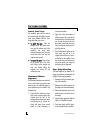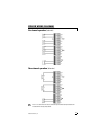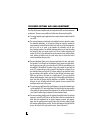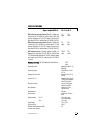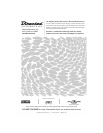
6
© 2003 Directed Electronics, Inc
INSTALLATION GUIDELINES
1. Please read this owner’s manual
carefully before installing this ampli-
fier.
2. Disconnect the battery ground
terminal prior to making any elec-
trical connections.
3. Check for any hazards or obstruc-
tions such as gas tanks, fuel or
brake lines, and wiring harnesses
before mounting the amplifier.
4. Pick a mounting location that will
provide adequate access and venti-
lation and protect the amplifier
from heat, moisture, and dirt.
5. Avoid sharp metal areas when
routing cables to the amplifier, and
run RCA cables away from the
power cables and other potentially
noisy car harnesses.
6. The amplifier should be grounded
with a short, heavy gauge wire
connected directly to the car at a
bare metal surface, preferably
scraped body sheet metal. Do not
use factory ground locations, seat
bolts, or brackets that are
spotwelded.
7. Always fuse your power connection
within eight to ten inches of the
battery terminal. Use a fuse or
circuit breaker rated slightly more
than the on-board fuse(s) of the
amplifier(s). The gauge of power
wire used should take into account
the total current draw of the
system, and the length of wire
used. IASCA and other auto sound
competition organizations have
charts available for this; you can
also find a chart in the MECP study
guide. Minimum wire gauge recom-
mendations for the individual ampli-
fiers are listed on the specification
page. Always use the same gauge
wire for the amplifier ground that
you use for the power wire. Be sure
to examine the battery ground
cable of the vehicle, and if neces-
sary, upgrade it by adding an addi-
tional ground wire that is the same
gauge as the amplifier’s power
wire. Remember, the amplifier can
only deliver its rated output when it
is not current limited by the power
and ground supply wires.
8. This amplifier is designed to drive a
speaker load that measures from 2
to 8 ohms (sub channel, 2 to 4
ohms). Keep in mind that heat is
the long-term enemy of automotive





